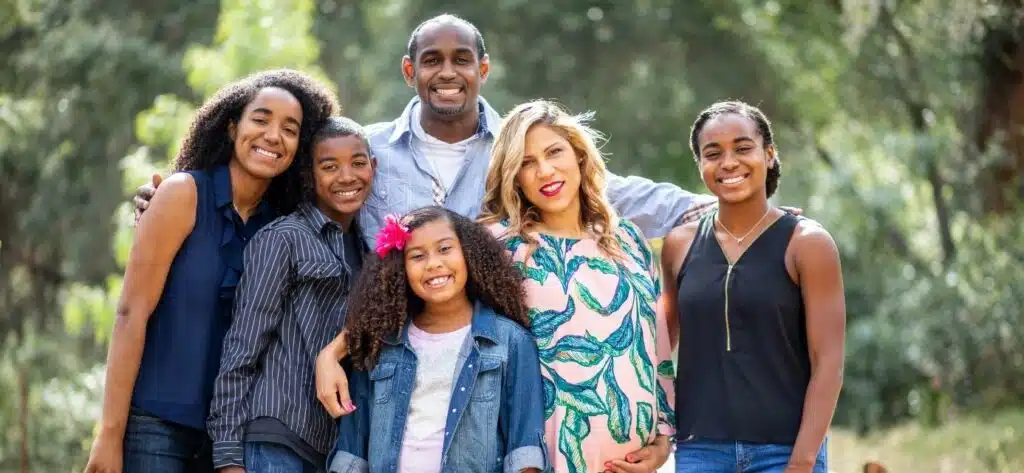Being a good parent can feel like an impossible achievement. And if you mess up, the consequences feel dire—your child’s well-being is on the line, after all. It’s true that your parenting skills will inform and impact the health of your family and your child. But it’s also true that no parent is perfect, nor should they be.
While perfection is not the ultimate goal, you can learn to improve your caretaking abilities through good parenting tips and examples of good parenting. Feeling more confident and well-equipped to parent will boost both your well-being and your child’s.
Key Takeaways
- Good parenting skills prioritize a child’s safety, security, and physical and emotional well-being.
- Examples of good parenting include offering unconditional love, validation, praise, and clear boundaries.
- The 4 Cs of parenting include care, consistency, choice, and consequences.
- Teen and family treatment at Newport Academy helps reconnect and repair the parent-child bond.
What Are Good Parenting Skills?
Good parenting skills prioritize a child’s safety, security, and physical and emotional well-being. These skills help a child grow up to have high self-worth, a healthy attachment style, compassion, self-compassion, and trust in the world around them. In other words, good parenting skills help children to become healthy, well-adjusted adults who treat themselves and others well.
Research shows that good parenting skills help teens have better mental health and higher self-esteem. Furthermore, skillful parenting can prevent teens from experimenting with drugs and alcohol.
Parenting skills examples include being able to set boundaries, knowing how to talk to a teenager, and dealing with defiant teens. Moreover, good parenting skills also encompass self-care, like finding ways to stay calm when facing parenting challenges.
Why Are Parenting Skills Important?
Gaining better parental skills can help your child become better adjusted and improve their mental, physical, and emotional well-being. Good parenting skills foster confidence, self-esteem, self-worth, and trust in your teen. These skills also help your child seek out and maintain healthy relationships. And good parenting helps your child foster key life skills, such as developing healthy coping mechanisms for difficult emotions.
Furthermore, parental skills improve your relationship with your teenage son or teenage daughter. If you work to improve your parenting, your child will be more likely to trust you and value your input. They’ll come to you more often with their problems and concerns. And both of you will feel more connected and secure in your relationship.
Good parenting matters not only for you, but for the whole family. Good parenting skills inform the family dynamic and the health and well-being of everyone in it.
10 Top Parenting Skills
Every parent wants to raise healthy, happy, successful kids. But that’s easier said than done. At one time or another, anyone who parents will experience a moment where they feel too exhausted, frustrated, and emotionally depleted to be the best parent they can be.
And that’s okay. Nobody is perfect, including parents. You don’t have to be at your best all the time in order to raise well-adjusted and healthy kids. And there is no cookie cutter way to parent that works for everyone. Many different parenting styles can be effective and positive.
But there are skills you can cultivate to improve your parenting style and your relationship with your kids. A scientific analysis of parenting skills by Robert Epstein whittled these down to 10 practices, which he called “The Parents’ Ten.” These 10 parenting skills are based on a combination of expert advice, things that appear to be most effective, and the things parents actually do.
Here are Epstein’s 10 parenting skills.
- Love and affection, including unconditional love, physical affection, praise, and quality time together
- Stress management, through regulating your own nervous system as well as your child’s—including practicing and teaching effective ways to relax and express emotions in a healthy way
- Relationship skills, including showing respect and care for others even in conflict
- Encouraging autonomy and independence by treating your child with respect and high regard and supporting body autonomy, consent, and self-reliance
- Prioritizing education and learning, by allowing your child to explore their curiosities, as well as providing appropriate educational opportunities for them
- Modeling life skills, like financial and future planning
- Behavior management, through extensive use of positive reinforcement rather than punishment or other punitive measures
- Supporting health, including both physical and mental health practices for yourself and your child
- Spirituality, which may look like a respect for nature, a connection to something bigger than oneself, or a compassionate religion
- Ensuring your child’s safety, including mental, physical, and emotional safety, by being aware of their activities, behaviors, mental health, and friendships
Is Unconditional Love a Parenting Skill?
Focusing on unconditional love is one of the healthiest and most useful parenting skills to develop. Unconditional love means a parent loves their child regardless of the child’s achievements, outcomes, or mistakes.
In other words, the child knows they don’t have to do anything to earn their parent’s love. They are loved, respected, and accepted for exactly who they are, not what they accomplish.
But unconditional love doesn’t mean you should be lax in setting boundaries or upholding expectations and consequences. On the contrary, kids respond better to parents who are firm, but also fair and warm.
Unconditional love is a bit too broad and all-encompassing to be considered a skill on its own. But many good parenting skills can be found under the umbrella of unconditional love. These skills include things like respect, validation, praise, and supporting independence and autonomy.
The 4 Cs of Parenting
In addition to parenting skills that have been proven to be effective, there are also the 4 Cs of parenting. The 4 Cs of parenting are guiding principles to simplify the responsibilities of a parent. They include care, consistency, choice, and consequences.

Stability in routine, environment, and behavior. Kids need a stable home environment to feel confident and secure. They need consistency to remain trusting of their caretakers.

Choice means allowing your child to become independent through the ability to make their own decisions and explore the world around them.

A parent’s willingness to express affection and unconditional love for the child, accept the child for who they are, and support them in their growth and development

Natural occurrences that result from a choice or action. Kids need to learn that their behaviors have consequences in order to inform their future behaviors.
10 Tips for How to Be a Better Parent
Improving your parenting skills can feel intimidating. But being a better parent is about making the effort, not being perfect. Getting better at parenting is done the same way you get better at anything else. In other words, through practice, repetition, patience, and trial and error.
Here are 10 tips for how to be a better parent through cultivating healthy skills and improving your relationship with your child.
Praise and appreciate your child.
There are sensitive teens. Don’t just praise them for their accomplishments. Offer praise for their natural character strengths, like humor, courage, and kindness. Praise them for sticking to their values, and for showing up for others and for themselves.
Offer validation.
Validate your child’s emotions and experiences, even when you don’t fully understand where they’re coming from. Teens want to be respected and acknowledged. Validating their fears, joys, and frustrations will help them feel heard and safe.
Maintain connection.
Connect with your child frequently, through conversations and with physical affection. Make sure they know you’re there for them. Model and encourage healthy emotional expression, including tough emotions like anger or sadness.

Encourage autonomy.
Allow your child to be their own independent, autonomous person. This includes autonomy over their body as well as in the world around them. Encouraging autonomy in your child teaches them to find their own voice in the world.
Avoid helicopter parenting.
It’s tempting to be a helicopter parent and try to protect your kids from anything that could hurt them. But it’s actually better for a teenager to make their own choices and be responsible for the consequences that occur. This teaches them that their actions matter and will help them make good decisions in the future.
Create clear boundaries and consequences.
Discipline doesn’t mean punishing kids. New research shows that physical discipline and overcontrolling behavior is associated with poor mental health in children. Instead, set and enforce clear and fair rules, and consequences for breaking those rules.
Model healthy relationships.
This includes being respectful, taking responsibility for one’s own behavior and reactions, and treating others (and yourself) with compassion and kindness.
Have high expectations.
Parenting experts use the word demandingness to describe how much parents control their child’s behavior and require them to be mature. Having a high level of demandingness combined with a high level of responsiveness is associated with authoritarian parenting, which research shows is the healthiest parenting style. Hold your child to high standards—without shaming them when they don’t achieve a goal.
Be responsive.

Responsiveness refers to how accepting parents are of their child’s behavior and how sensitive they are to their child’s emotional and developmental needs. Being responsive and attuned to your child’s needs will help them achieve healthy development and maturity.
Practice self-compassion.
Being kind to yourself, even when you’re not feeling great about your parenting, will help you stay balanced and positive. Research done on parenting during COVID found that parents who were more self-compassionate were less critical of themselves, experienced less stress, and were less likely to perceive parenting challenges as personal failures.
How Treatment at Newport Academy Supports Good Parenting Skills
Raising a teen is no easy feat. It’s normal to struggle with the question of how to be a better parent. Improving your parental skills can help improve your relationship with your child as well as help them develop and mature in a healthy way. Poor parental skills can create conflict for the teen and parents at home, in school, and in personal and family relationships.
Teen treatment at Newport Academy can help teens and families manage difficult emotions, build better parenting skills, improve communication, and develop healthy coping tools. Newport Academy treats the whole family system, not just the adolescent. Our teen treatment programs help rebuild parent-child bonds to help teens and parents trust and respect one another and strengthen family relationships. We tailor our treatment to clients, using modalities including CBT, DBT, and family therapy in order to provide the best possible care.
Teens, parents, and families in Newport Academy treatment programs receive:
- Tools to cultivate unconditional love, emotional connection, and respect among the whole family
- Problem-solving skills for dealing with personality clashes, defiance, and other difficult family issues
- Resources to build connection, self-esteem, self-worth, trust, and confidence in oneself and with others
- Healthy coping mechanisms to navigate the stresses of adolescence and parenting
Start the healing journey today: Contact us for a free teen or family mental health assessment.
Frequently Asked Questions
What are the 10 main parenting skills?
What are parenting skills examples?
What are the 4 Cs of parenting?
Why are parenting skills important?
Sources
Epidemiology Psychiatric Sci. 2023 Mar; 32 (e16): 10.1017.
Fam J Alex Va. 2022 Apr; 30(2): 164–173.
J Psychol Behavior Stud. 2021 Dec; 10.32996.
Front. Psychol. 2021 Oct; 12: 10.3389.






